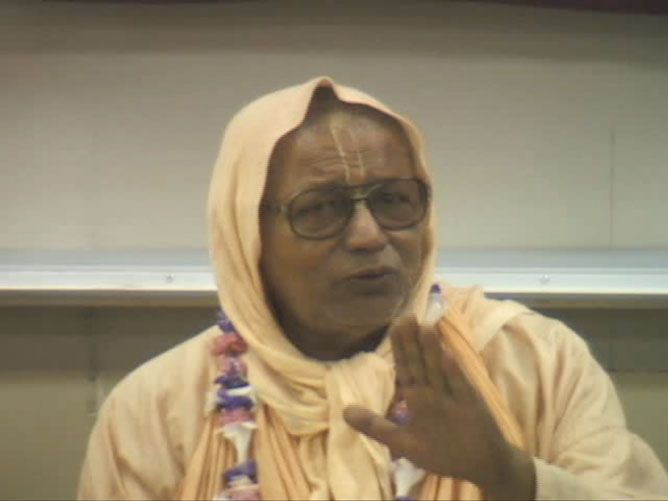WISDOM STORIES
LEARN BY HEARING NOT BY SEEING
The embarrassment of assuming others to be the same as ourselves.
Adapted from an illustration by Srila Bhakti Siddhanta Saraswati Thakur.
When the English first arrived in India, they were not entirely familiar with all the fruits, vegetables, and customs that they found there. Once, an English magistrate of the ICS (Imperial Civil Service) who had a very long beard and moustache was given a ripe jackfruit. He asked his assistant what it was, and his assistant explained that it was a very sweet fruit which is broken open and then eaten. The magistrate told his assistant to put the fruit in his private chamber. Later, he retired to his chamber, closed the door, and started to eat the jackfruit.
The magistrate broke open the jackfruit, threw away the flesh, and began to chew on the rinds of the fruit. He found them somewhat sweet and happily continued sucking on them. Gradually, the sticky gum that oozes from the rinds spread into his beard and moustache. As he wiped his face, the gum stained and tangled his facial hair. He found that he couldn’t remove the gum even by washing his face and saw in the mirror that he looked quite disheveled. He then called for his assistant and severely chastised him for giving him this fruit as some kind of impudent practical joke.
The innocent assistant was frightened by the magistrate’s anger and began to cry in fear of what the magistrate might do to him. Eventually, he said, “O Sahib, please hear just one thing from me. Then, if you decide I have made an offence to you, you may do as you wish with me.”
The magistrate relaxed a little. The assistant said, “O Sahib, you’ve eaten the wrong part of the jackfruit. What you are eating is the part that is supposed to be thrown away, and the egg-like things in the middle are what you are supposed to eat. I should have explained more clearly how to eat it, but I have not made any offence to you. Please now consider what you wish to do with me.”
The magistrate understood his own mistake and gravely ordered, “Call a barber. But I am warning you! Do not tell anyone about this, and also warn the barber so that he does not tell anyone either. I don’t want anyone to find out about this.”
The assistant said, “As you order” and brought a barber. The barber trimmed the magistrate’s beard and moustache.
Seeing the magistrate with a trimmed beard and moustache the next day in court, many people in attendance exchanged glances with one another. The magistrate ignored this and gave attention to the case and the witnesses of the day. Eventually, a Bengali brahman scholar was called to testify. Seeing that the Bengali brahman also had a trimmed beard and moustache, the magistrate laughed and said to him, “Yes, I understand. You too must have eaten some jackfruit. How was it?” The Bengali brahman could not understand what the magistrate was talking about. He was stupefied and fearful of the magistrate. He began to tremble with fear. The magistrate then ordered that the brahman be brought to his private chamber at lunch time, and the brahman gave no further testimony.
After eating his lunch, the magistrate called for the brahman and again asked him the same question. The brahman, bewildered, started to cry. The magistrate then started to console him, saying, “It’s not such a big mistake. Why are you crying? I also sucked on the wrong part of a jackfruit yesterday and had to trim my beard and moustache to remove the gum. I have to say that the fruit from your country is not very nice. In my country, the fruit is not so troublesome to eat.”
Thinking he’d found someone who had gone through the same experience he had, the magistrate became very happy and gave the brahman a five rupee reward. Unsure whether the brahman would laugh or cry, the magistrate’s assistant quickly took him outside.
PURPORT
Atmanam manyate jagat: we consider the world to be like ourselves.
When we seek good association on the spiritual path, we search for a sadhu, an exalted and advanced devotee of the Supreme. But when we meet a sadhu, we should not think the sadhu’s mentality is the same as ours. If we do so, we will end up in a laughable position like the English magistrate. As he concluded that a highly cultured person was as unaware of a common custom as he was, so we may think a sadhu is an ordinary person who shares the same perspective and pursuits that we do. Instead of this, we should take the opportunity to learn about the sadhu’s perspective, and we can do this only by hearing from the sadhu. Thus, it is said that we see a sadhu not through our eyes but through our ears: we see a sadhu properly through the sadhu’s message and not through the lens of our acquired assumptions or prejudice.
If we seek to have a spiritual perspective on all that we encounter in life, we will find spiritual truth all around us, but if we have a egotistical perspective, then matters of egotistical pursuit will be all that we see:
narayanamayam dhirah pasyanti paramarthinah
jagad dhanamayam lubdhah kamukah kaminimayam
“The wise who seek the highest good see that the world is pervaded by the Supreme Lord but the greedy see that the world is full of wealth, and the lustful see that the world is full of women.”









